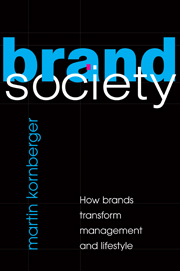3 - The making of brands
Published online by Cambridge University Press: 10 January 2011
Summary
Market economy
Before we analyse the way brands are manufactured, it might be helpful to briefly describe the economic context in which they circulate. The next two sections will take the scenic route past the economic backdrop against which brands take shape. We will use Michel Callon's notion of economy of qualities to set the scene. Of course, if you're in a hurry (or if you're Michel Callon), feel free to jump straight to the section on advertising practice.
How are brands brought into existence and how are they institutionalized? What roles to they play in the contemporary market economy? If brands are about interaction between individuals, organizations and society, how do they relate to our economy, which is based on transactions?
In many respects, Thomas Hobbes' theory of social and political order sets the scene for our argument. He paints a picture of a bi-polar world in which either order, civility, sovereignty and rule flourish, or a state of chaos prevails in which homo homini lupus est ‘and the life of man is solitary, poor, nasty, brutish and short’.
Hobbes atomizes society into individual actors, who are nothing but calculating machines driven solely by self-interest. This reckless pursuit of individual interests creates, on a societal level, total disorder. According to this logic, salvation can only be achieved if everybody cedes their individual powers to a Leviathan, a kind of benevolent dictator-state.
- Type
- Chapter
- Information
- Brand SocietyHow Brands Transform Management and Lifestyle, pp. 49 - 84Publisher: Cambridge University PressPrint publication year: 2010



